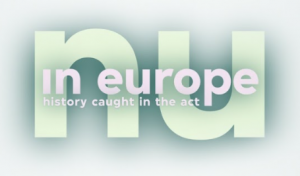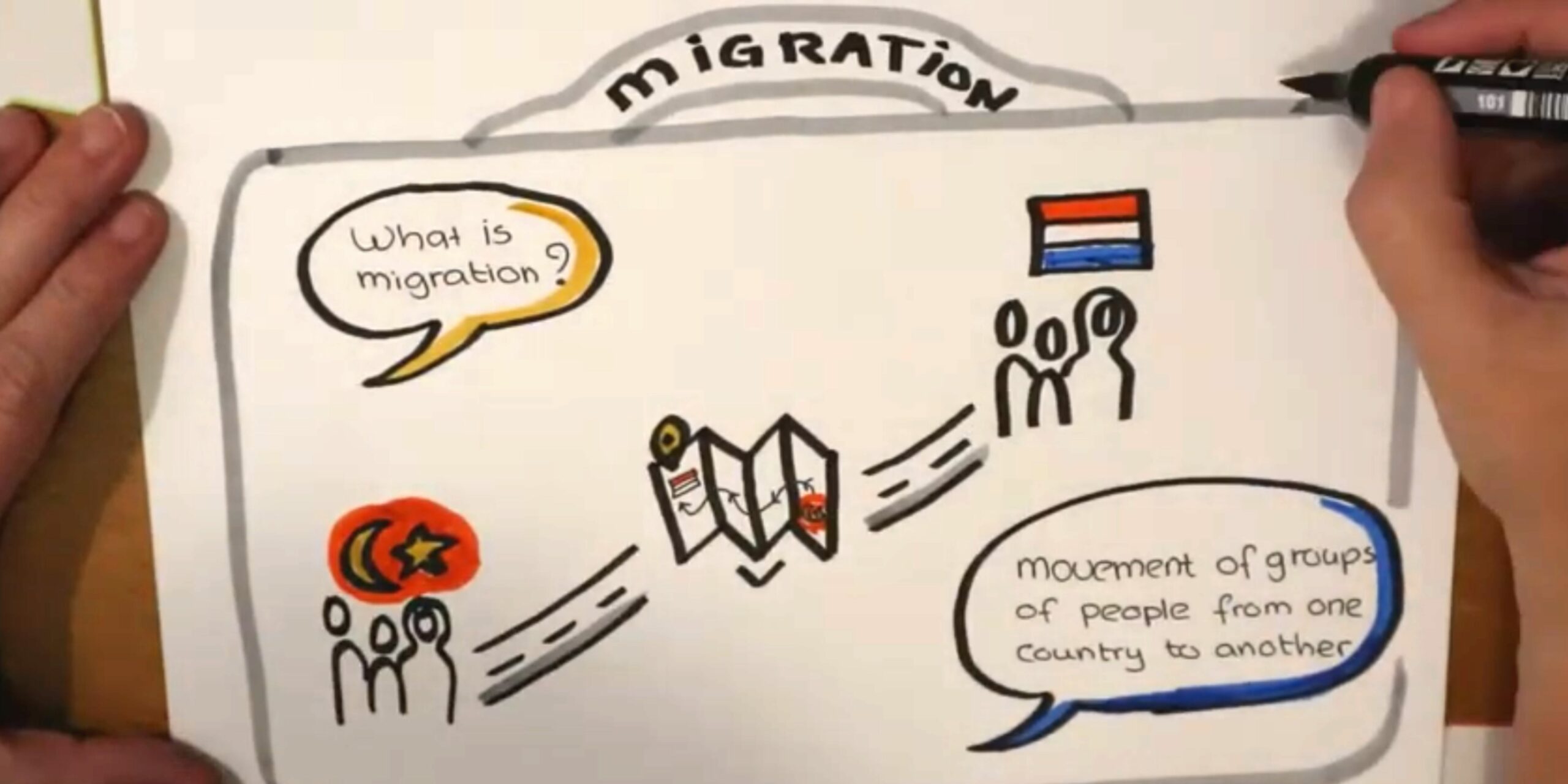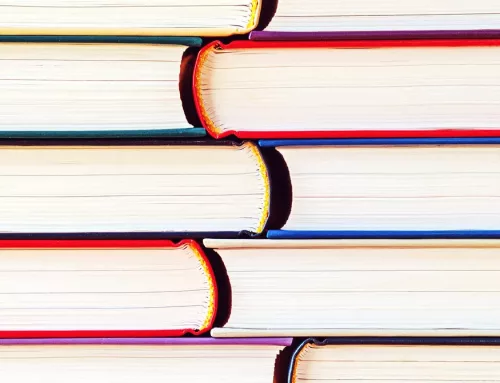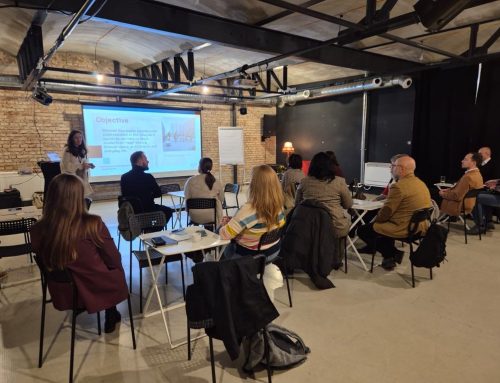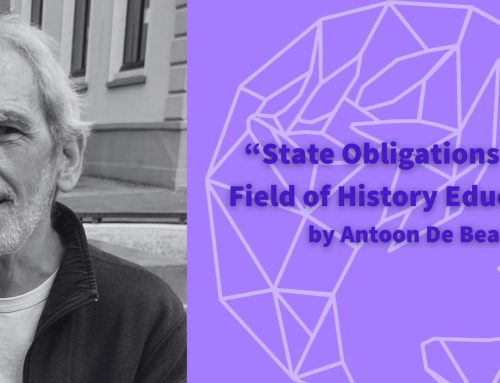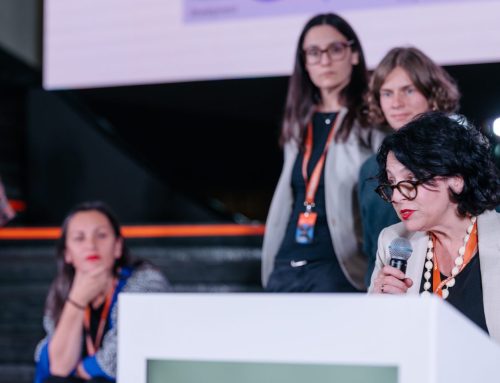In 2019, EuroClio joined forces with Dutch public broadcaster VPRO for the development of In Europe Schools, an online exchange project meant for European schools, teachers and youngsters to meet and cooperate. By 2021, more than 110 schools from 30 different countries have registered, and many decided to start a new round of the project.
“In Europe Schools” encourages a transnational approach of teaching Modern European History: European schools partner up to cooperate in the research, filming, documentary-making and finally exchanging not only their respective documentary, but also their ideas, experiences and opinions on rather controversial themes, such as difficult history, migration, climate change and gender equality. The project aims to foster collaboration between European teachers and youngsters and ultimately strengthens students’ capability of doing research and their media literacy skills, but it also enables them to acknowledge history as history in the making.
At the end of the school year 2020-2021, EuroClio sat down with some of the schools that joined the project to know more about their experiences, discuss the strengths of the project, but also difficulties and suggestions for improvement. Several teachers – but also students! – were interviewed, among which Deirdre from the Kandinsky College, Kristina from Elgoibar Ikastola, Matej from OŠ Belokranjskega odreda Semič, and Amaia from Santo Tomas Lizeoa. In addition to that, teachers from different schools had the opportunity to meet each other, exchange experiences and practices, and share thoughts and feedback with EuroClio during the peer learning event, held on 17 June 2021.
Meet the teachers: Amaia, Matej, Kristina and Deidre
Why did you decide to participate in this project?
Amaia: We wanted our students to connect with students from other European countries, give them the opportunity to discuss their work and exchange experiences with students in other countries.
Matej: I wanted to give my students the opportunity to participate in an international project. The topic of migrations is close to my students, as we live at the Schengen border and illegal migrations are common. I also wanted my students to communicate with students from other countries.
Kristina: Our school is committed to international projects. In addition, the goal of the project is in line with our curriculum and competency model.
Deirdre: It is a great opportunity for students to work on beneficial topics with students from other countries.
How has the response of the students changed throughout the project?
Amaia: In the beginning, our students were not so confident with their knowledge of the topic and their command of foreign languages, but participating in the project has helped them to gain confidence.
Matej: My students started this project very open-mindedly, despite the fact that we live in a conservative region, where immigrants are not appreciated, or rather local people feel a certain amount of fear towards immigrants. Different perspectives, given in the project, even enlarged student’s empathy towards immigrants.
Kristina: Although the task at first seemed abstract and difficult for them, they gradually adapted to the task and came out with a very tidy job.
Deirdre: They have become more involved in the history lessons.
What was the biggest challenge?
Amaia: Finding interviewees was quite difficult. Language has been an added difficulty for some of our students, but not all. Finding the right rhythm for both schools was difficult, since we often had holidays and exams at different moments and therefore, we had difficulties to agree on deadlines and online meetings. We had to make some changes in our organization to be able to keep the contact.
Matej: Due to Covid-19 our country experienced one of the longest lockdowns in Europe. For 6 months we had online school. Making documentaries was quite a big challenge. All communication was made via online meetings.
Kristina: The hardest part has been finding close and real testimonials. It’s not easy to put people in front of the camera.
Deirdre: Time, planning and research skills of students. While the lesson plans are very clear, we realised that the research part is quite open, so students either step up to the challenge or lose it a bit.
Were there any clashes in the classroom because of different opinions/perspectives?
Amaia: Not really, our students were mostly of the same opinion, and when they discussed with our partner school students, we discovered that they had similar views on the topic.
Matej: No, not really. However, we were not able to discuss the topic as thoroughly as we wanted.
Kristina: Even though the affair was tough and difficult to deal with, the students kept their distance.
Deirdre: Not really. We do encourage an open atmosphere in class so it was ok to debate some topics.
How did Covid-19 affect the outcome?
Amaia: Last year´s lockdown made it very difficult for us to organise and coordinate the groups. Finding interviewees and making the interview was more difficult due to Covid-19 restrictions. But in the end, we managed.
Matej: We had some problems finding time for all the activities in the project. That is also the reason why we needed a lot of time for our documentaries.
Kristina: Of course, the pandemic has not made it easier to interact with people. And in our case, we wanted to deal with similar experiences.
Deirdre: Group work proved to be tricky as well as keeping distance while creating documentaries and carrying out interviews.
Did you create a meaningful relationship with your partner school?
Amaia: I think we did. We ended the project with a final online meeting of the different groups, and this event was highly valued by our students. They were very happy to have the opportunity to get to know students from other countries and talk to them about their experiences.
Matej: Sadly, no. We even changed our partner school. We sent our documentaries to the school and I tried to organise an online meeting. I was not successful with that. We also did not get any feedback on our work or received documentaries from other schools. I am very disappointed because of that.
Kristina: In our case, we couldn’t fit a better colleague. The teacher is very knowledgeable, hardworking and ideal for directing this type of work and project.
Deirdre: Yes, our Spanish partners were great. With our Turkish partners, it was a little more difficult due to expectations and time differences.
Do you have any suggestions on how this project could be implemented?
Amaia: The project as it is designed right now does not require much contact between partner schools until the end. We would suggest starting collaborating and getting to know each other from the beginning: instead of each school making their own videos and then showing them to their partner school, it could be more productive to mix the groups from the start, making them international from the beginning, so that the relationship between students becomes more collaborative from the first stages of the project. It would make the organization more complex, but it would also be a more enriching experience.
Matej: I would like to thank Eugenie from EuroClio, for all the help and support. It was very hard sometimes to continue with this project, but her emails of support helped us to finish our work. I think being in contact with project leaders is very important, even when it is only about moral support.
Kristina: Everything was fine, maybe next year we can share part of the research or we can mix our students up.
Deirdre: Although I know it would be more difficult to arrange, I think it would be more beneficial if the students could actually work with their International partners to create one documentary.
What do students say?
All students agreed that such initiatives offer a new approach to history as a subject, and a different way of learning which enabled them not only to get an insight into specific moments of history, different perspectives and cultures, but also to encounter direct witnesses.
Although researching is often the most difficult part, students are trained to find reliable information and develop their media literacy skills: overall, they genuinely enjoyed discovering facts that most likely they would have not encountered in a text, and coming across interesting anecdotes that they did not know of. It inevitably pushed them to further investigate their findings, test their knowledge and develop their research skills.
Everybody enjoyed creating a documentary from scratch, starting from researching the topic and then filming. It proved to be an effective way to learn about the past and about the way our past is so deeply interconnected with our present, which positively contributes to shaping a more informed society. It obviously helped them develop their digital skills: they learnt how to record and design the video. Video making was their favourite part: from doing the interviews to filming, video editing and seeing the documentary coming together. They were all excited whilst seeing their ideas taking shape, and eventually satisfied and proud of seeing what they were able to create.
Also watching documentaries from the partner school proved to be fascinating, as they found that they could learn a lot more about different histories of different countries compared to solely reading the history book envisaged in their curriculum.
Students’ views regarding the theme did not necessarily change, but they did get to learn a lot more: researching made them understand the topic better, and encountering multiple, at times contrasting perspectives was thought-provoking. Others affirmed that prior to the project, they did not have much knowledge about their topic, so ‘In Europe’ helped them to form an opinion. For privacy reasons, we cannot share their names, but we are proud to share some of the positive comments we received:
These kinds of initiatives raise awareness, especially among young people, about problems in the world. We were also able to express our opinions.
We have learnt new things, met people, and practised English, but at the same time you have to work hard and the topic can be sensitive.
We developed both academic and creative skills.
It was such a fun way to learn about a topic and it’s very nice to learn differently than just sitting in the classroom.
You learn a lot more about different histories of different countries than you learn in the book.
It was an interesting and fun approach to help students know more about world history.
I got to know the perspectives of both sides of the difficult history and formed an opinion.
Where are we going from here?
Teachers found the project to be well organized and the different steps clear, and they also appreciated the assistance provided by EuroClio. They were particularly happy about the fact that they could decide which topic to focus on, for example, in order to select a relevant topic for the history of their country or to still be able to follow their history curriculum.
The main difficulties revolved around the communication and the cooperation between the schools, however, coordinating with the partner school is truly the key to the success of the project: students can benefit a lot from online meetings and they particularly appreciate having the chance to engage with other European students – in some schools, this relationship continued after the project thanks to social media! For this reason, the implementation of a platform for communication could be of great use in order to enable schools to work together and build a stronger network and relationships.
Few schools have mentioned the importance of having clearer guidance on what recording/editing programmes shall be used for the making of the documentary, and others would appreciate having more resources categorized per topic.
We are genuinely grateful for the positive feedback we received, and we are also working on improvements. EuroClio will implement new sessions to explain the project and the toolkits, networking sessions for teachers and try to create an online learning community for students as well.
Both teachers and students really enjoyed taking part in this project because it’s a different kind of activity for teachers, but also a different way of learning for students, that keeps them more motivated and engaged. Some schools are planning to do this project as an interdisciplinary project between different subjects. Most schools will join again next year, because students want to do it again!
Written by Giulia Verdini
Are you struggling with keeping students motivated and engaged in the classroom? Let them investigate, film and tell their own current (hi)story! Climate Change, Gender Equality, Migration, as well as Difficult History, are the histories and challenges of all of us today. Sign up here for next year! [/su_box]
Watch the latest documentaries!
You can find all the videos made by students on our YouTube Channel.
Source Image: Turkish Migration | Titus Brandsma College
